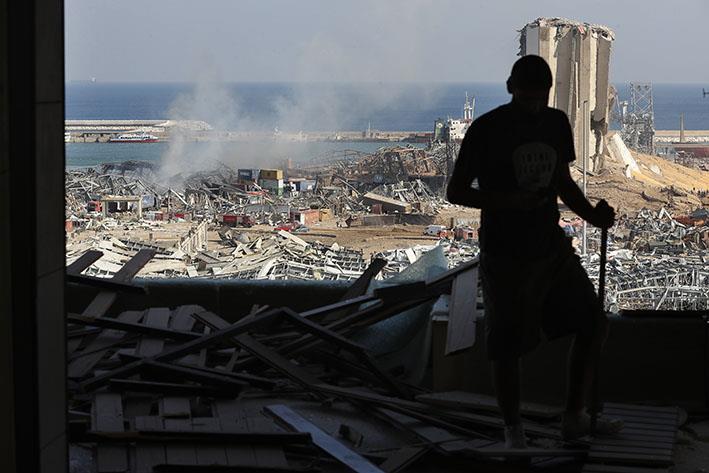Mario Camilleri was sitting in his garden when he heard what sounded like military jets flying overhead. A few moments later, he heard what sounded like a sonic boom, followed a couple of seconds later by two large explosions.
“The ground shook as if during an earthquake, and the sky over Beirut turned red. A huge plume of smoke rose up into the sky.”
Mario and his family live in Harissa, on Mount Lebanon, some 20 kilometres away from the Lebanese capital, but the sound of the explosions was so loud that he thought they were much closer.
“We quickly turned on the television and the first reports were coming in. Eventually, it was announced that the explosions had rocked the port of Beirut,” said Mario, who has been living in and around the city since 1987.
At first he thought it was an air strike, he said, explaining that Israeli warplanes often fly overhead on their way to bombing missions in neighbouring Syria. The authorities said, however, that this was an accident, caused by ammonium nitrate that had been seized by the authorities six years ago and was being stored in a warehouse in the port.
“There were conflicting reports and we feel like no one is really saying the truth,” he remarked. Some news stations linked the blasts with the verdict in the trial of four men over the 2005 truck bomb slaying of former PM Rafik Hariri. Others said it was a fireworks explosion. It later emerged that the explosion was caused by a chemical that is often used as a fertiliser or as a component in explosive devices.

Mario Camilleri lives in Beirut and described the scene after the massive explosion in the Lebanese capital
The blast left more than 100 people dead, with scores missing and over 4,000 injured. Several videos of the explosion were posted on social media. The secondary explosion was more powerful than the first and sent a mushroom cloud flying up in the air. The powerful shockwave caused by the explosion was also caught on camera, shattering windows and ripping off balconies as it travelled through the surrounding area. The explosion was heard as far away as Cyprus and registered a quake of 3.3 on the richter scale.
“The area around the port was flattened,” Mario explained. “They said the initial fire was caused by flying sparks from welding works. The firefighters came and were trying to extinguish the flames but were caught up in the explosions. Many people are still missing and some of them might never be found.”
While people were pointing fingers, it is clear that the volatile material should not have been kept in the port area, he said. “There were 2,750 tonnes of ammonium nitrate that had been seized six years ago. The authorities knew that it was dangerous to keep it stored there, but nothing was done about it.”
The central district of Beirut now looks like a graveyard, he said. “Many people have become homeless and the hospitals cannot cope. Several hospitals in the area were being used to treat Covid-19 patients and the authorities are now trying to relocate these people to make room for the casualties of the explosion.”
‘Lebanon cannot afford another tragic event’
The Malta Independent also spoke to a Lebanese man living in Malta who has family still residing in Beirut.
Fadi Abou Rjeily has been living in Malta for two years, said: “a massive explosion like this is not what Lebanon needs, and I sure hope that nothing else tragic happens, at least not this year.”
Apart from the effects of the Coronavirus pandemic, Lebanon was already on the brink of economic collapse due to the severe crisis which led to several mass protests in recent months.
Tuesday’s tragedy has left many people missing, with relatives pleading on social media platforms for help in order to locate their loved ones.
Fadi expressed his relief that all his relatives are safe and were not injured by the explosion.
He further explained that the house in which his family is residing is around 10 km away from the explosion site, located at Beirut’s port.

Fadi Abou Rjeily has lived in Malta for two years, but has family living in Lebanon.
“Although they weren’t very close to the Beirut port, nevertheless, they heard the explosion very loud and clear as the blast was felt by residents living miles away from the explosion site,” he said.
“Their house was not damaged in any way; however, the adjacent streets were filled with debris and shards of glass.”
Fadi also remarked that, apart from his relatives, he has several friends who live in Lebanon and have also been impacted by the explosion, including two of his friends who lived just two kilometres away from the port.
He said that “the blast of the explosion injured one of my friends and destroyed their house.”
Fadi said he called his family “the minute I heard what had happened. Although the messages were not going through immediately, my brother called me shortly after and reassured me that everyone was in good health and safe.”
He added that, “I feel completely helpless being here and not being able to help my family in any way but I’m very relieved that they are safe.”
Maltese soldiers safe
Several countries pledged financial aid and also sent search and rescue team and medical personnel and supplies to Beirut.
Throughout the night, radio presenters read the names of missing or wounded people. An Instagram page called “Locating Victims Beirut” sprung up with photos of missing people. Another account helped to connect the newly displaced with hotels and homeowners who were willing to host them.

10 Armed Forces of Malta soldiers currently stationed in Lebanon are safe and sound, Home Affairs Minister Byron Camilleri said yesterday. According to reports, however, a number of soldiers forming part of the United Nations peacekeeping force were among the injured.